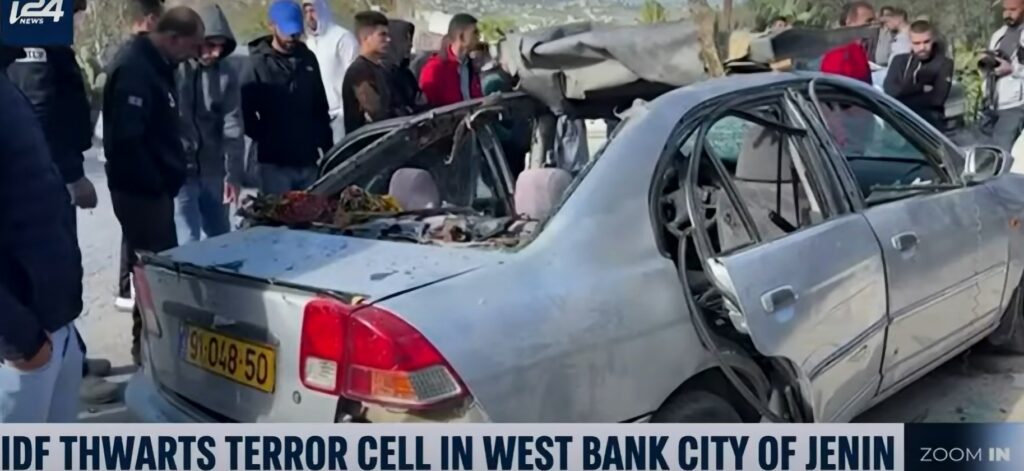On June 21st, the IDF and the Shin Bet successfully neutralized three members of an Islamic Jihad terrorist squad in the Jenin area using a drone.
This marked the first airborne operation to eliminate terrorists in Judea and Samaria since 2006.
The three terrorists, who had previously fired upon the Al-Jalama checkpoint, returned to Jenin in a vehicle. They were tracked by an Israeli Air Force drone, which launched a missile at their vehicle, resulting in their deaths.
Senior security officials in Israel confirm that the IDF is adopting an offensive policy by reintroducing the practice of assassinations in Judea and Samaria.
The focus, for now, lies in the Jenin area. This marks a shift from the existing Israeli security policy, prompted by the recent deadly attack in the settlement of Eli and the escalating militarization of the Jenin area.
Furthermore, armed terrorist groups have begun utilizing large explosive charges against IDF forces entering area A for the purpose of apprehending wanted terrorists.
Alongside the return to targeted assassinations, the IDF has deployed additional military forces to Judea and Samaria in preparation for a series of surprise military operations against the terrorist organizations.
The adoption of targeted assassinations aims to combat the increasing terrorism in the Jenin area, a result of pressure from the American administration to avoid large-scale military action in northern Samaria for fear of destabilizing the Palestinian Authority.
Additionally, this approach seeks to minimize harm to IDF soldiers and increase deterrence.
The Terrorist Organizations’ War of Attrition
Hamas officials claim that the attack carried out by operatives from the Izz a-Din al-Qassam military wing in the settlement of Eli signifies their intention to escalate terrorist activities in Judea and Samaria beyond northern Samaria.
Hamas, in coordination with the Islamic Jihad and the Iranian “Revolutionary Guards,” aims to initiate a war of attrition against Israel, targeting not only Judea and Samaria but also the Jordan Valley.
Iran considers Judea and Samaria a critical front against Israel.
During a meeting in Tehran with a Hamas delegation, Iran’s Supreme Leader Ali Khamenei stated, “The Gaza Strip is the center of resistance, but the West Bank is the one that will defeat Israel.”
According to Israeli security officials, Saleh al-Arouri, the head of Hamas’s military wing in Judea and Samaria, is responsible for the deadly attack in the settlement of Eli. From Israel’s perspective, he is considered “sentenced to death.”
Meanwhile, the IDF continues to conduct daily arrests of wanted terrorists throughout Judea and Samaria, as well as demolishing the homes of those responsible for acts of murder.
The IDF has prepared contingency plans for special operations targeting terrorist hotspots. However, they are awaiting the opportune moment to surprise the highly alert terrorists following the attack in the settlement of Eli.
A senior security official acknowledges that the decision to return to targeted assassinations is a necessary one but believes it was delayed.
Ultimately, targeted assassinations alone cannot dismantle the terrorist infrastructure of over 20 armed groups.
Therefore, it is estimated that an extensive military operation in the Samaria region is inevitable.
The terrorist organizations threaten that the continuation of targeted assassinations will lead to rocket fire from the Gaza Strip into Israel.
The IDF assesses that regardless, the security situation in Judea and Samaria will escalate.
They are also prepared for the possibility of renewed hostilities along the border of the Gaza Strip, with rockets being fired from southern Lebanon and Syria toward Israel.
Iran’s direct involvement in the events unfolding in Judea and Samaria is concerning.
Iran supplies weapons and funding to terrorist organizations through smuggling routes in Jordanian territory, and Israel faces challenges in stopping this smuggling phenomenon.
Currently, terrorist groups in Judea and Samaria closely coordinate their operations with terrorist organizations in the Gaza Strip. They also receive support from Iran in terms of weaponry, financing, and moral encouragement, which further fuels terrorism.
The Islamic Jihad has pledged to avenge the deaths of the three terrorists killed by the Israeli drone. The security establishment predicts that terrorism will persist with full force, even during the upcoming holiday of sacrifice (Id al-Adha). It is also possible that individual terrorists may attempt revenge attacks within Israel itself.
This necessitates the utmost vigilance of Israeli citizens and permits holders to carry weapons.
Successful terror attacks only serve to embolden terrorism and encourage further acts of imitation.
The security establishment is actively working to curb terrorism and prevent it from engulfing all of Judea and Samaria, potentially leading to a third intifada.




